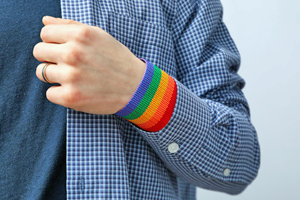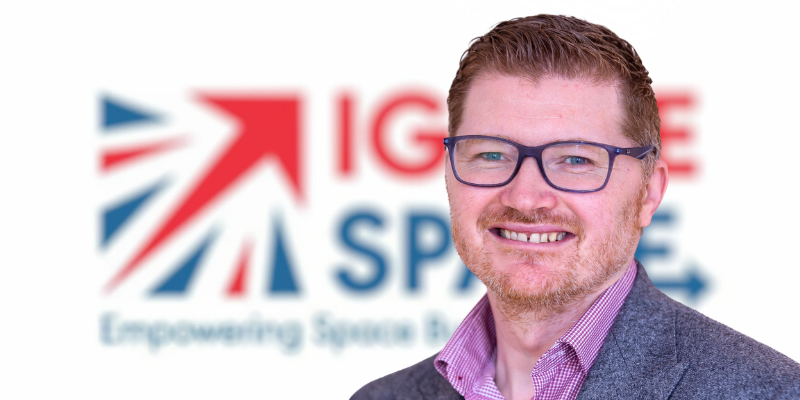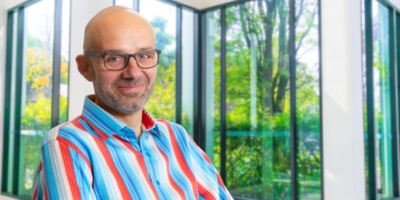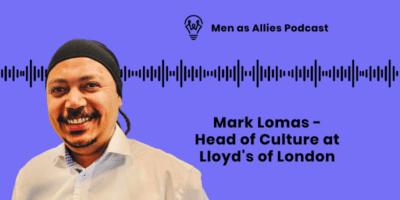Dr Craig Brown is investment director at the UK Space Agency, responsible for leading the Agency’s work to catalyse investment in the UK space sector. Craig studied at the University of Leicester, before spending 18 months on a traineeship at the European Space Agency and then going on to study for his PhD back in Leicester, and then spending six years working for Airbus and five years at Innovate UK, followed by three and a half years at SatixFy. Craig is extremely active in the UK space community, having led the equality, diversity and inclusion work for the Space Skills Advisory Panel as well as helping coordinate the programme for the UK Space Conference.

“All the evidence shows that where you have better diversity of thought you get better outcomes, so it’s a fundamentally important thing for the Agency, and business at large, that the teams we build are as diverse as possible.”
Why shouldn’t it be me?
Starting at the beginning — I did my GCSEs in a South Wales comprehensive school and went on to college to do the International Baccalaureate. From there I went to University of Leicester to study physics with space science and technology. I spent four years there and I did my master’s as part of my first degree.
I was unemployed for six months between university and my first job but I was lucky enough to get onto a traineeship with the European Space Agency, so I went to live in the Netherlands for a year and a half and learned how to design space missions.
That was a fixed-term contract, after which the European Space Agency paid for me to go back to the University of Leicester and do my PhD. I spent the usual three years doing my PhD. I realised quite early on that I didn’t want to be a career researcher so after I’d finished collecting my data at university, I took a job with a company called Airbus Defence and Space (although it was known as Atrium at the time) designing space missions for the European Space Agency.
It was my first ‘proper’ job and it was also my ideal job. If you’d have asked me as a teenager what I wanted to do I think I told my comprehensive school careers advisor that I wanted to design space missions for a living but she told me: “Don’t be so silly. You should be a teacher. “But then I thought: “Well, someone needs design space missions, so why can’t it be me?” I went to a comprehensive school that wasn’t used to sending its pupils to university.
Dreams can come true … but then what?

I began looking at future research and development in preparation for future missions and the development of future technologies. I also got a real taste for the business of space and also the politics of space, and understanding how we needed to ‘sell’ space to ministers and decision makers within government to make sure that space was well-funded and to make sure that space was the top priority. I got very much involved in the very early discussions with politicians and ministers around the importance of space to the economy, and how space could be an economic driver.
I eventually left Airbus after six years and went to work for, Innovate UK, the UK’s innovation agency, where I was innovation lead for space for five years. I left Innovate UK to go back into industry where I worked for a small business called SatixFy, where I spent three years. I helped to take the company public during that time and then I was lucky enough to land this job at the UK Space Agency, where I’ve been since December, so just over six months. I’m still relatively new into post. My job title is director of investment, and I look after quite a significant team within the agency, responsible for a number of things.
In a nutshell, it’s about investing public money well in new innovative ideas and products and services to prepare the UK for the future when it comes to being able to access the new emerging markets within the space sector. It’s also about catalysing private investment into the space sector, so a big part of my role is dealing with private investors and private investment to attract as much of that into the UK space sector as possible.
Championing inclusion and challenging discrimination
My personal interest in inclusion I guess, as is often the case in these things perhaps starts off being a little bit selfish. I’m a gay guy within my domain that’s traditionally a very male-dominated area, so it wasn’t always the easiest thing to be out on the career path I’d chosen.
It’s not just within the workplace either. That journey as a child of the eighties has always been quite challenging, right from school under Section 28 [of the Local Government Act 1988], where teachers weren’t allowed to talk about gay relationships in a positive light and it was illegal to present gay relationships as anything other than abnormal.

That really coloured my life, and it inevitably takes its toll on you personally if you can’t be your true, authentic self, whether that’s in school or in the workplace. I’d say that I understand firsthand what it is like to feel like you don’t have the same opportunities as your colleagues within the workplace.
With hindsight, I think a lot of that comes internally. It’s not necessarily something that comes from the workplace, but it’s something that you are led to believe within yourself, and that colours your behaviour, so I’d say that is a personal motivation.
I’ve also got the personal motivation I have because of my strong sense of justice and fairness. It really upsets me when people can’t enjoy their job, particularly if it’s related to who they are and the perception of the things that they do, so discrimination is something that really frustrates me across the board.
But my interest in inclusion goes well beyond just LGBTQ+ issues. Working in the innovation space and in the business area, specifically to grow the economy, it has always been a frustration of mine that it was not very well understood that inclusion leads to better ideas, better innovation and ultimately to better business.
I can never quite understand why we put so much effort into growing the economy without at the same time putting a similar amount of effort into diversity and inclusion, which would in itself have a massive bump in terms of innovation and return on investment for the economy.
Inclusion in the UK Space Agency
The Agency is fully committed to having a truly diverse workforce and a culture of openness and inclusivity to help us deliver better outcomes for the community we serve.
Our aim is to mainstream the delivery of inclusion by building on and expanding on the protected characteristics to deliver for all our people. We adopt a broader definition of diversity to include socio-economic, work experience and geographic backgrounds.
Our vision is to harness the power of difference to build the right capabilities, processes, and culture so that our people can thrive and help create a great place to work and by delivering against the following four priorities:
- To be an employer of choice and a great place to work – championing space and building an Agency where talented people choose to work and stay.
- To have appropriate representation of all groups at all levels of the Agency – an Agency that is representative of the communities that it serves and everyone irrespective of background is able to fulfil their potential.
- To create a healthy working environment for all – promoting a wellness culture so that everyone is able to achieve a healthy work-life balance.
- To build a culture that promotes respect, fairness, collaboration and innovation – ensuring that our staff work in a safe and healthy environment and are treated with dignity and respect.
We use data-driven and evidence-led approaches informed by both the feedback and personal experiences of our people and quantitative data collected through our People Survey, to drive progress and transparently measure success, maintaining our focus on achieving key priorities outlined in the Declaration on Government Reform.
We work collaboratively with our Diversity and Inclusion Champions and Staff Networks, recognising the benefits of being inclusive and sharing knowledge, experience, and insights so the Agency is seen and experienced as a visibly inclusive employer. We have a dedicated Diversity and Inclusion and Wellbeing team; as members of the Cross Government Head of Diversity and Diversity Leads Group, we are committed to being at the forefront of initiatives to create a forward-thinking, diverse and truly inclusive UK Space Agency which fully aligns with the approach set out in the Civil Service Diversity and Inclusion Strategy.
Why we should all aspire to be allies
All the evidence shows that where you have better diversity of thought you get better outcomes, so it’s a fundamentally important thing for the Agency, and business at large, that the teams we build are as diverse as possible.
Gender diversity is an important part of that diversity but over time it has become clear that diversity and inclusion aren’t just about one characteristic. We all have to be permanently aware of intersectionality. These things aren’t mutually exclusive, and ultimately, we’re all individuals.

The gender diversity aspect is one of the first broad metrics that we have to address, and it is probably the most visible element of diversity, but that’s not to say that we must do these things in sequence either. Diversity is something that we should always try to address in parallel. There isn’t one part of diversity that’s more important than another.
If everybody who’s underrepresented looks out for everybody else who’s underrepresented that’s when we get the real momentum, isn’t it? I’ve spoken about my sexuality, and allyship is central to that. Equally, male allyship for women is fundamentally important if we are to address these issues.
I’ve often thought that the lack of gender balance within organisations is a male problem. That’s not a women’s problem, but very often the approach from organisations is to put the burden of addressing it onto women through the ‘women’s groups’ within organisations that are predominantly, if not exclusively, staffed up by women in the organisation.
When the recruiting managers in an organisation are largely male, having an all-women group doesn’t necessarily fix the fundamental problem, and I am a problem solver so I look at these things from a pragmatic perspective. Allyship is fundamental to the resolution of the issue.
It really makes the difference as well when somebody is well known and they’re shouting about all this stuff. I’ve been in a number of job roles where a good personal network has been fundamental to the success of that role, but it’s also something that I really enjoy. Getting to meet new people and learn from them is probably the most pleasurable part of my role.
I love collecting interesting people around me, which stems, I guess, from a need to be helpful to other people, so a good network is often built from that. I don’t think it’s something that I do on purpose per se, it’s just something that happens quite organically and naturally. I grew up hearing: “It’s not what you know, it’s who you know,” and there is an element of truth to that, but I wasn’t born with a network. The school I went to was on the wrong side of the tracks so I haven’t gone to the ‘right’ school and been gifted with a network from family. It’s something I’ve built up myself.
Coming up next
The UK Space Conference is happening up in Belfast from the 21st to the 23rd of November this year. We will be hosting our national Space Conference in person for the first time since the pandemic, which is going be very exciting.
It will be a great opportunity to get all key stakeholders from the space sector altogether in one place.
The Space for Everyone Tour, which is currently going around the UK, aims to captivate and educate the next generation, showcasing the UK’s flourishing space industry and the diverse array of career opportunities available. The tour features a 72 feet replica rocket for young people to learn more about how the UK is launching into space, and includes hands-on experiences to engage and fire up the imagination.
That’s a wrap for our #SpaceForEveryone tour in Swansea!
Check out the highlights below. 👇
Next stop: Leicester!
Come over to the @spacecentre from 29 June – 3 July to learn more about space careers and see a 72 ft replica rocket! 🚀 pic.twitter.com/4RiJnZj7rr
— UK Space Agency (@spacegovuk) June 28, 2023
The UK Space Agency Inspiration Programme has a distinct objective to improve diversity and equality of opportunity, primarily to benefit the space sector, but also STEM uptake in general.
Our projects focus mainly on supporting the major touch points in young people’s lives and the adults and infrastructure around them. This aims to provide resources for all children from all backgrounds and locations in the UK. For example, partnering with:
- The Association for Science and Discovery Centres on a project called Our World From Space, which will upskill staff, provide resources, and reach young people and parents through their local science centre.
- STEM Learning Ltd, who delivers a space education resource office for the UK that supports teachers and classrooms around the UK with teaching resources, access to training, and space professional role models from wide backgrounds to engage with young people.
In addition, we fund projects that have specific targeting, for example:
- Jon Egging Trust will reach over 3000 of the most disadvantaged students around the UK, using space as an inspirational context and engaging them with diverse role models.
- Our partnership with Girlguiding to deliver a space badge for brownies, and Scout Association to deliver badges for girls and boys to participate in nationally.
Critically, we are evaluating every project to determine how we can better improve diversity and inclusion across our interventions.
The UK Space Agency was recognised by the International Astronautical Federation for ‘Excellence in 3G Diversity’ 2022 – Gender, Geography and Generation, which makes me and my colleagues incredibly proud.
There is always more to done but by keeping inclusion as a top priority we’re keeping up the momentum of progress.





